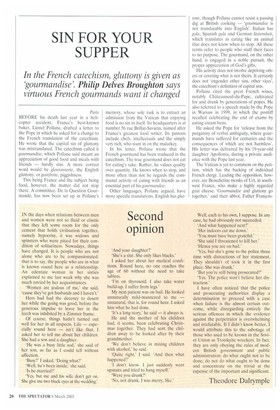Second opinion
IN the days when relations between men and women were not so fluid or elastic that they left some room for the only cement that holds civilisation together, namely hypocrisy, it was widows and spinsters who were pitied for their condition of solitariness. Nowadays, things have changed. It is people who are not alone who are to be compassionated: that is to say, the people who are in what is known round here as a relationship. An edentate woman in her sixties explained to me last week why she was much envied by her acquaintances.
'Women are jealous of me,' she said, 'cause they've got husbands and I haven't.'
Hers had had the decency to desert her while the going was good, before the generous impulse to leave her in the lurch was inhibited by a Zimmer frame.
Of course, things hadn't turned out well for her in all respects. Life — especially round here — isn't like that. I asked her to tell me about her children. She had a son and a daughter.
'He was a busy little sod,' she said of her son, as far as I could tell without affection.
'Busy?' I asked. 'Doing what?'
'Well, he's been inside,' she said.
'Is he married?'
'Yes, but me and his wife don't get on. She give me two black eyes at the wedding.' 'And your daughter?'
'She's a slut. She only likes blacks.'
I asked her about her medical conditions. Round here, no one reaches the age of 60 without the need to take tablets.
'I'm on thyroxoid. I also take water build-up. I suffer from legs.'
My next patient was on bail. He looked unnaturally mild-mannered to me — unnatural, that is, for round here. I asked him what he had done.
'It's a long story,' he said — it always is.
He and the mother of his children had, it seems, been celebrating Christmas together. They had sent the children away to be looked after by their grandmother.
'We don't believe in mixing children with alcohol,' he said.
'Quite right,' I said. 'And then what happened?'
'I don't know. I just suddenly went upstairs and tried to hang myself.'
'Were you drunk?'
'No, not drunk. I was merry, like.' Well, each to his own, I suppose. In any case, he had obviously not succeeded. 'And what happened next?'
'Her indoors cut me down.'
'You must have been grateful.'
'She said I threatened to kill her.' 'Hence you are on bail.'
'Yes, but she's gone to the police three time with distractions of her statement. They shouldn't of took it in the first place. She was drunk.'
'But you're still being prosecuted?' 'Yes. The police won't believe her distraction.'
I have often noticed that the police and prosecuting authorities display a determination to proceed with a case when failure is the almost certain outcome, while disregarding entirely the serious offences in which the evidence against the perpetrator is overwhelming and irrefutable. If! didn't know better, I would attribute this to the sabotage of those who used to be known in the Soviet Union as Trotskyite wreckers. In fact, they are only obeying the rules of modern British government and public administration: do what ought not to be done; do not do what ought to be done and concentrate on the trivial at the expense of the important and significant.
Theodore Dalrymple


































































 Previous page
Previous page